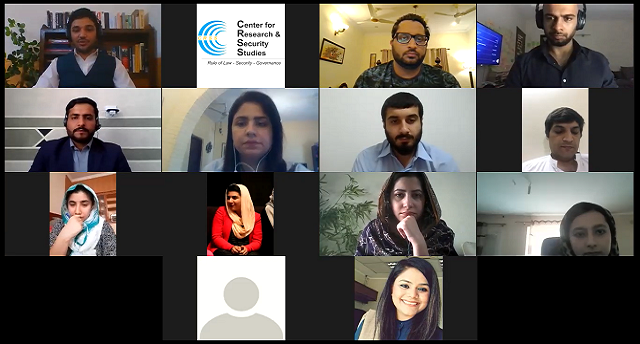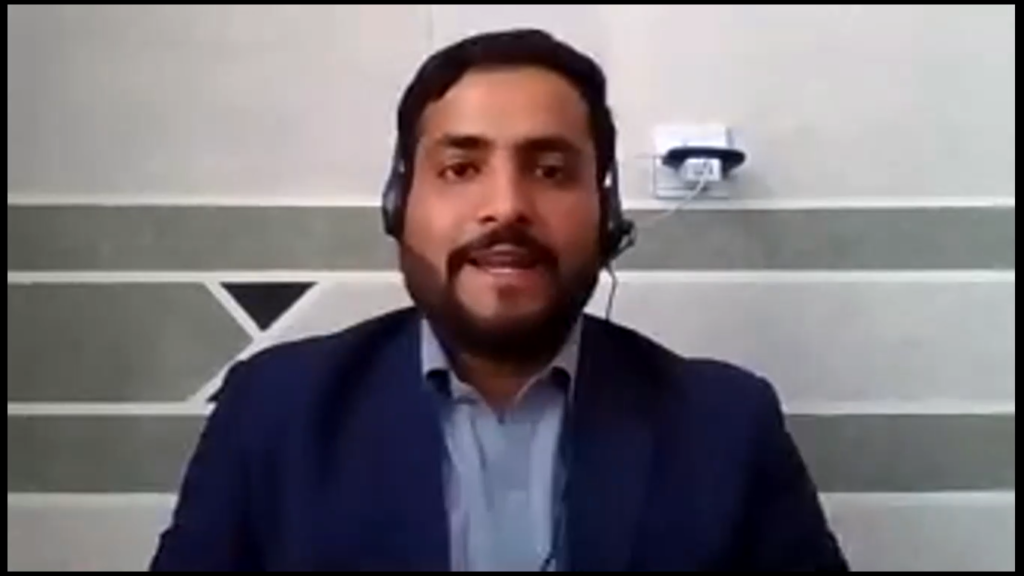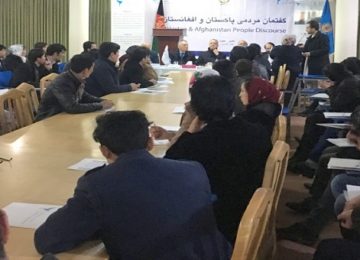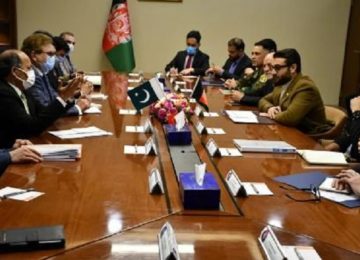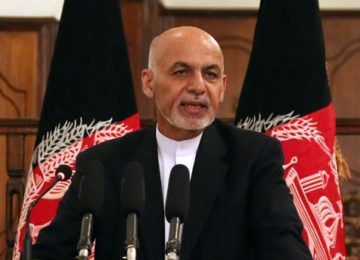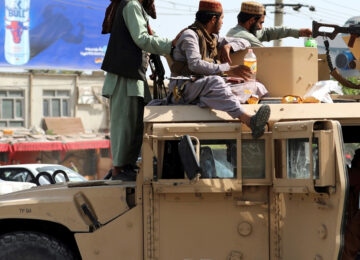May 23, 2020
Afghan Studies Center (ASC) organized a virtual youth dialogue on the theme “Emerging Regional Geo-Politics in the Context of Accelerating Afghan Peace Process” on May 22, 2020 on Zoom. Amina Khan, Director, Center for Middle East and Africa (CMEA) as well as Afghanistan at the Institute of Strategic Studies Islamabad (ISSI) was invited as the Chief Guest and Keynote Speaker for the subject dialogue.
Imtiaz Gul, Executive Director, CRSS and Afghan Studies Center, in his opening remarks stated that the agreement between President Ghani and Abdullah Abdullah has paved the way for intra-Afghan dialogue where now Abdullah will be leading the reconciliation process. This generates some hopes; once he engages through his team with the Taliban and other stakeholders, we hope something better comes out of it and Afghanistan moves towards peace, said Gul. He stressed that in such time the role of youth becomes critical as the future belongs to them. He advised youngsters to stay positive and work for the betterment of the people on both sides of the border.
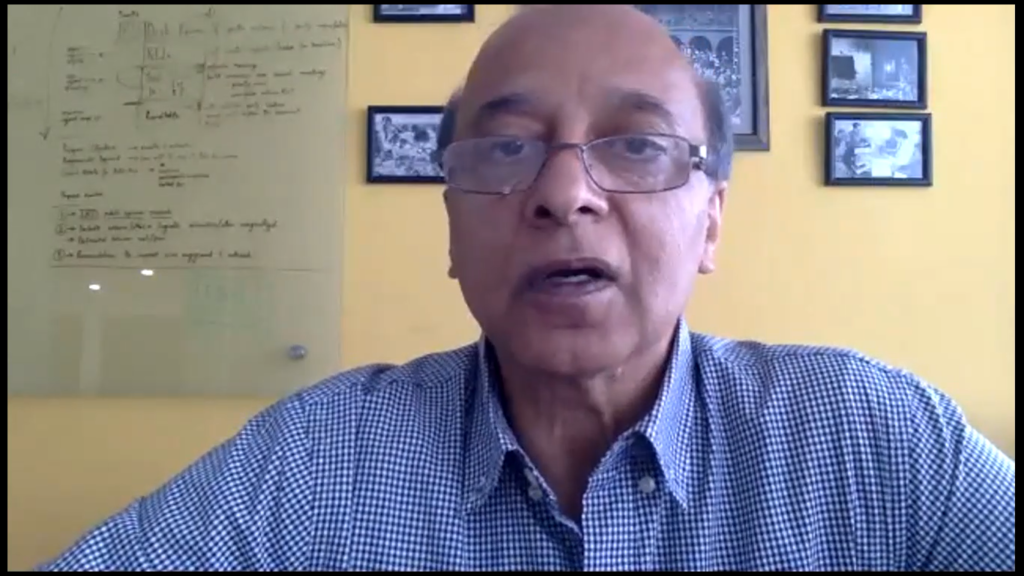
The dialogue was attended by 12 youth participants – 5 Afghans and 7 Pakistanis, belonging to Kabul, Islamabad and Peshawar in addition to the ASC team.
Saddam Hussein, Program Officer at Afghan Studies Center (ASC), who was moderating the session, introduced CRSS and Afghan Studies Center. In the introductory note, he stated that the current developments regarding Afghan peace process are the closest the region has come to in reaching a political solution since 2001. A peace treaty with the Taliban would allow not only Afghanistan’s political order, but also the international involvement, regional security architecture, and Afghanistan’s position to be re-negotiated as a Western ally.
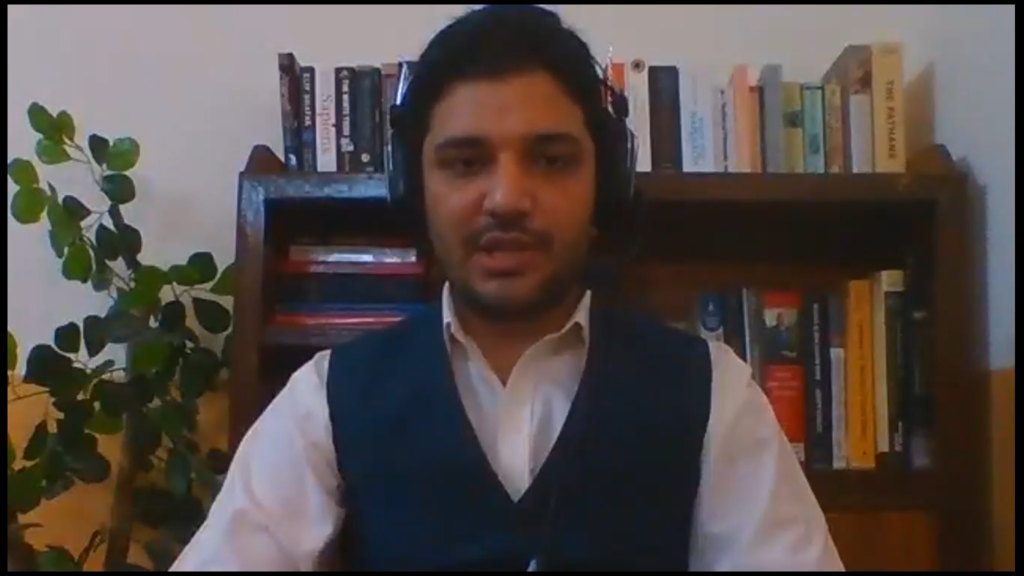
The course of the peace process, however, will be influenced not only by in-country developments, but also by external factors. Not to forget, Afghanistan is a geo-strategic interface between Central Asia, South Asia, and the Middle East, making it the playing field for regional and great power conflicts, such as the India-Pakistan conflict, Iran’s nuclear showdown with the US, Russia’s rivalry with the US order, and the conflict surrounding China’s economic hegemony. Thus, for regional countries, the developments offer an incentive to restructure the regional peace and security order.
Hussein further stated that to assess the progress of the peace process and the future regional relationships, it is worth considering the threat perceptions, strategies, interests and security dilemmas of the countries in the region. How do they define their interests in Afghanistan and the region? What is their scope of action? What roles do they play in the peace process? What powers might emerge as “winners”, and how can the “losers” be engaged?
Amina Khan, while opening her speech, appreciated the efforts of Afghan Studies Center in bringing the youth of Pakistan and Afghanistan under one platform. She stated that although the past 18 years have been devoid of any meaningful political settlement in Afghanistan, 2019 proved to be a promising year in terms of reaching some agreement. Now, even though, the peace deal has been signed between the US and Taliban, there is little surety that there will be peace any time soon in Afghanistan. This is because of the mistake that the US made by signing the deal with the exclusion of one of the key players – the Kabul administration.
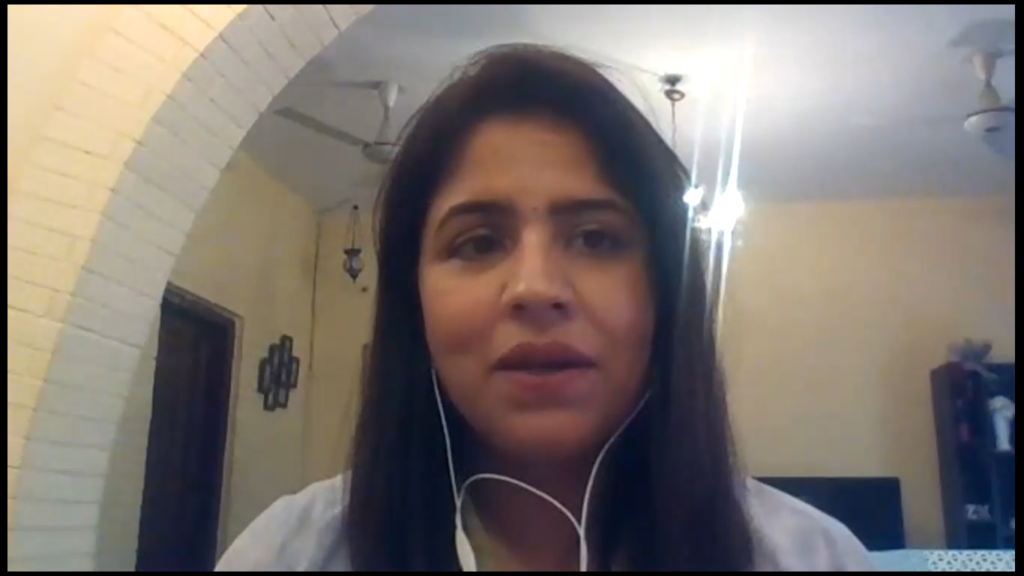
Ghani may be taken as a puppet of the US, but no one can deny that anyone sitting in Kabul represents the people of Afghanistan and, thus, any peace deal needs to include them, said Khan. At the same time, Kabul also has its shortcomings; there have been differences and divisions within which have undermined its legitimacy. The Afghan leaders need to get out of petty politics for peace. However, after the recent Ghani-Abdullah power sharing understanding, it is hoped that political uncertainty has been dealt with and that Afghan leadership can now focus on the bigger picture i.e. bringing peace to the country, she said.
Speaking of Taliban, she opined that they have undergone a subtle shift in their approach. Not to forget, initially it was Taliban who wrote an open letter to President Trump stating their wish to engage in peace dialogue and are now looking forward to constructive engagements. Taliban also stated time and again that the ‘monopoly of power’ is not something they are looking for; instead they are open to power sharing with other Afghan factions. This signals a certain degree of flexibility on Taliban’s part; creating a reasonable space for intra-Afghan dialogue.
Having said that, while Taliban continue to change their outward strategy, they need to work more on inward strategy, she said. They need to reduce violence to a significant level, if they do not completely cease it. Merely practicing violence to harness more bargaining power seems as a foul approach at the moment. US-Taliban deal has been signed; the prisoners exchange is taking place; regional countries are engaging with the Taliban; the Kabul government will soon be talking to Taliban. This is the gigantic bargaining power that the Taliban possess. So, they need to stop violence for two reasons; firstly, to win the trust of the common Afghans and secondly, to avoid any hindrances in the Afghan peace process. The onus is on the Afghan Taliban now, Khan said. It is now hoped that intra-Afghan talks take place soon and the peace process works out.
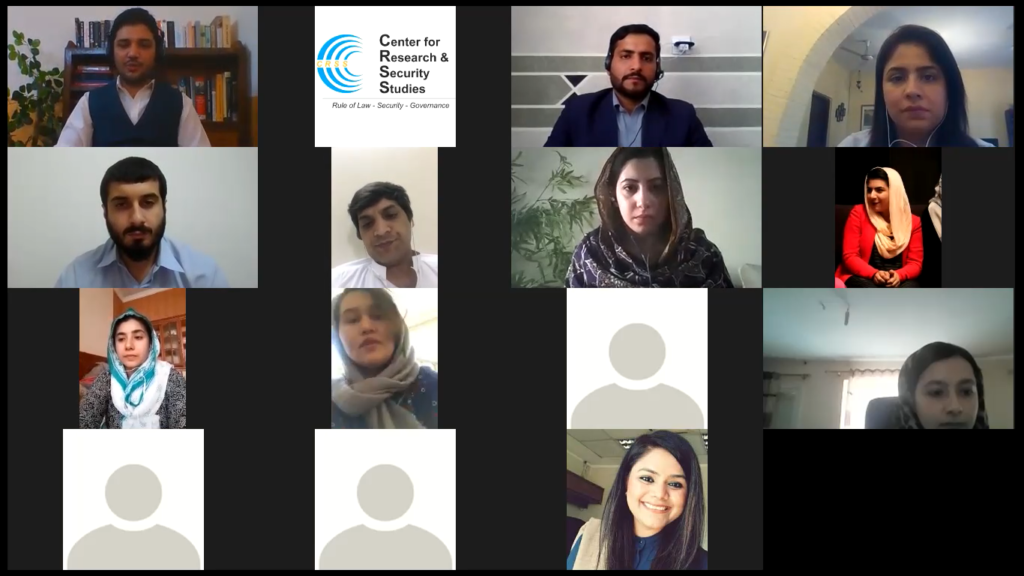
There is a growing realization within the regional countries that they can no longer depend on the international community to resolve the Afghan conflict. It is time for them to take ownership of the regional issues, including the prolonged crisis in Afghan. All regional countries have maintained diverging interests with respect to Afghanistan, but for the first time in history, the region is witnessing convergence; this is a win-win situation if properly utilized.
Commenting on regional geo-politics, Khan said that Pakistan has emerged as the key player in facilitating the Afghan peace process and the world is acknowledging its positive efforts in this regard. A peaceful Afghanistan is in the best interest of Pakistan, if the latter has to grow as a key player in the region as well as for the expansion of its economic domain. Islamabad has frequently assured that it will do everything to facilitate the Afghan peace.
On the other hand, India is relying on soft power but is rigid in its approach towards Afghanistan. New Delhi stands firm with the Afghan government and its constitution, but appears reluctant to engage with any other party for peace. This puts a big question mark on the future of India’s influence in Afghanistan. New Delhi’s approach seems only to be countering Islamabad, which makes its approach less pragmatic and harmful even for India itself.
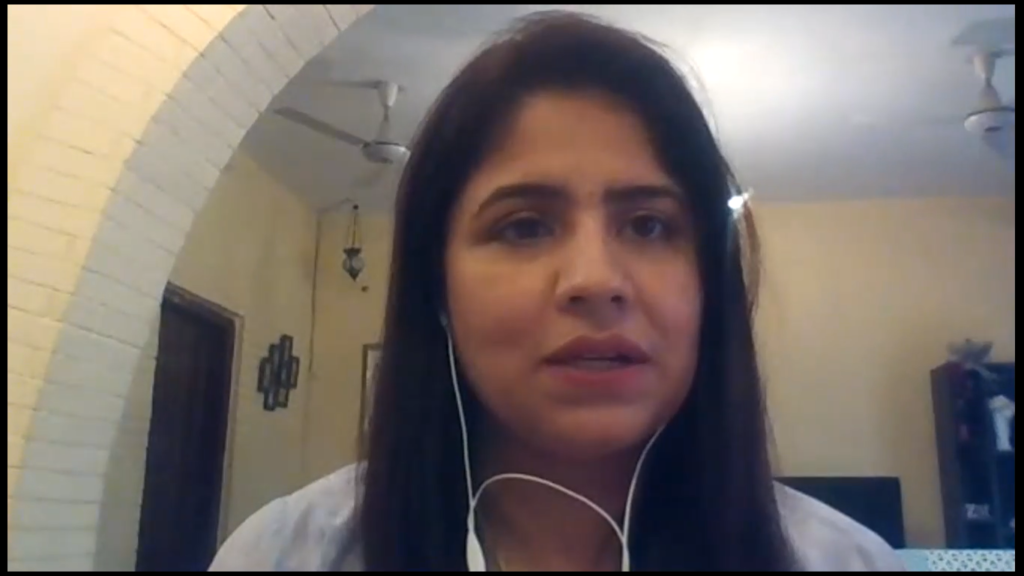
In parallel, Iran is pursuing an increasingly proactive strategy. As the American-Iranian conflict has escalated and the US sanctions have tightened, Iran has become critical of the Western stabilization efforts in Afghanistan and of the Doha peace process. The country, therefore, supports alternative approaches to peace and hopes for a “post-American stability” that provides sufficient security guarantees for Iran and the region, she added.
Moscow, too, has a vital interest in Afghanistan’s stability and territorial integrity. Russia does not want Afghanistan to become a new focal point for transnational terror groups and drug cartels that pose a threat to Russia and neighboring Central Asian countries. Combatting terrorism and drug trafficking hence plays an important role.
Regarding China, Ms. Khan enunciated that Beijing has so far avoided taking a visible leadership role in Afghanistan. Its Afghanistan policy is driven by economic considerations for its “New Silk Road” project and focuses on safeguarding national security interests. Sharing an 80-kilometer-long border with Afghanistan along the Wakhan Corridor in Afghanistan’s northeast, China is also interested in effective border controls to prevent the passage of drug smugglers and militant groups. It is pertinent to note that China has come out as the best candidate to be the guarantee of implementation of the peace process, as it enjoys cordial relations with all parties within Afghanistan, as well as with regional countries. A more interesting development is that even Washington is completely fine with China taking the lead role.
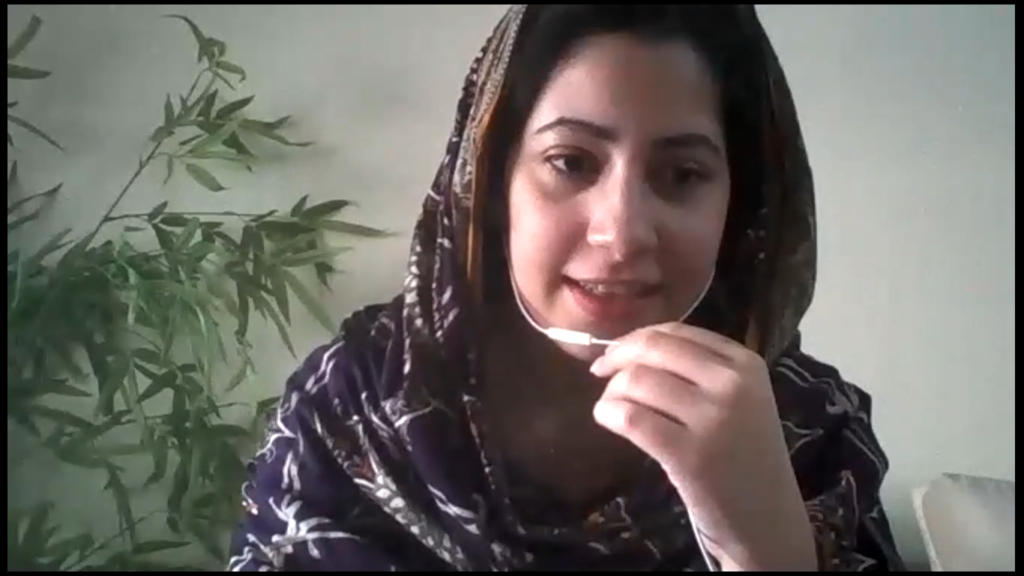
During the Question and Answer session, participants asked a few very interesting questions, such as, whether China is ready to clean up the mess left behind by the US or would it want the US to stay in Afghanistan until a new system emerges? Does excluding Kabul from the US-Taliban peace deal reveal US’ ulterior motives? Is US really interested in ending the Afghan conflict or the recent deal was just a stunt meant for Trump’s re-election?
In response, Amina Khan stated that China definitely would not take up the responsibility to clean up the mess left behind by the US. All the regional countries thus want a responsible withdrawal by the US as to not allow a vacuum leading to a civil war. Secondly, excluding Kabul from the peace deal was a big mistake on the part of the US, she said. The US should have emphasized on bringing Kabul on-board; however, there seems to be no ulterior motive, just a haphazard American approach. Thirdly, Trump’s re-election was at the pivot of the peace process, but US also has spent trillions of dollars and thousands of lives have been lost. So, Washington does want to way out of this conflict, one way or the other, irrespective of elections. Though, the timing of the peace deal may just enhance Trump’s position in the elections where he would play the card of a ‘shift towards inward looking policies’.
Towards the end of the discussion, all hoped that peace would prevail in Afghanistan soon; though, it takes time and patience. Nothing will change overnight, but step by step with an incremental approach. Last but not the least, with so many positive developments after 19 years of conflict, one can say that peace is possible, but sooner the better, to avoid any further collateral damage.
Afghan Studies Center’s 29th Pak-Afghan Youth Dialogue thus came to a close. This is the third virtual dialogue held between the youth from both countries due to the outbreak of Covid-19 which has forced people to stay indoors and put a halt to physical meetings and gatherings. The dialogue was a continuation of Afghan Studies Center’s ongoing series to bring the youth of Pakistan and Afghanistan on the same platform to debate and exchange ideas on political and non-political issues of mutual concern. ASC has also conducted 15 training workshops on various topics since April 2017.



